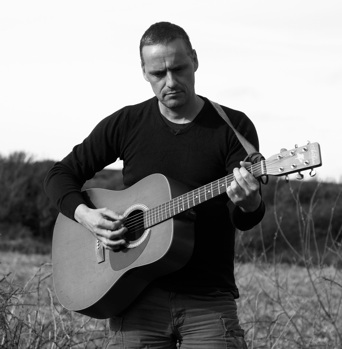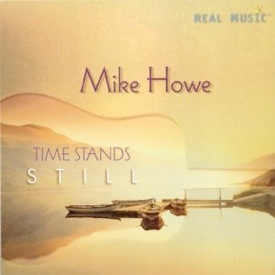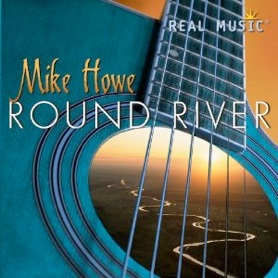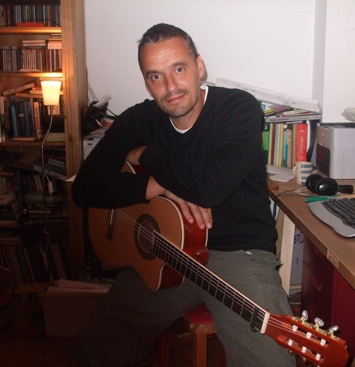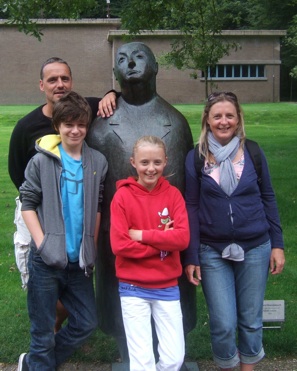One of the happiest musical surprises of 2009 was the release of Mike Howe’s debut CD,
Time Stands Still on the Real Music label. Gentle, heartfelt guitar pieces that come from deep within made for a sublime listening experience. I was anxiously awaiting Howe’s follow-up,
Round River, and wondered if he could match or top his first effort. I’m still jumping up and down about how good that album is, too, so it seemed like the perfect time to interview Mike and discover the person behind the music. A very warm and unassuming man who is passionate about his work as an ecologist in a Welsh National Park as well as his music, I think you will find this interview to be a delight to read!
KP: Hi Mike! How are things in Wales today?
MH: Hi Kathy, lovely to speak with you! Well funnily enough it's raining today! Up until the end of July we were having a great summer, but I'm afraid August has been pretty damp once again. My family and I have just returned from our annual trip to the Green Man Festival, which we absolutely love despite the rain and the mud! I get such a thrill out of seeing great live bands playing in such a lovely chilled atmosphere where everybody seems happy. So even though all the camping gear is wet and muddy and we're all a little tired, we're all very happy at the moment.
KP: Your weather sounds very similar to what we have here on the Oregon Coast, but it’s so green and beautiful that we really don’t mind all of the rain!
MH: Yes, I guess the rather wet climate in Wales is actually one of the things that makes the country so beautiful, especially in the mountains.
KP: What is the Green Man Festival?
MH: The Green Man Festival is a wonderful and vibrant music festival in a lovely part of the Brecon Beacons National Park. It's a smallish festival of around 10,000 people, and attracts musicians from all over the world playing what I'd loosely describe as folk/rock. Friends and family go every year and we have a really good time. We've seen lots of big name bands over the years, but the real attraction is hearing some of the up and coming bands and getting a feel for where the music in this genre is heading. I just love listening to live music and sharing the experience with friends, so I'm full of inspiration and ideas at the moment.
KP: Congratulations on the success of your debut album,
Time Stands Still, which was MainlyPiano’s Michael Debbage’s
favorite album for 2009 and also made his
Top 30 list for the decade! You were also nominated as “Best New Artist of 2009” by Zone Music Reporter. What an awesome start! Did those honors add pressure on you when you were creating and recording the music for
Round River (released 7/13/10 on Real Music)?
MH: Well, I was absolutely amazed and grateful to get such a positive response to Time Stands Still from so many people from around the world, and was particularly thrilled with yours and Michael’s reviews. I guess when you start writing and recording music you have no idea how others will respond to it, so obviously when they say nice things it takes a little while to sink in! Those responses gave me a huge boost in confidence and seemed to free me up to become more creative to such an extent that the songs for Round River were much easier to compose. I suppose that a lot of uncertainty about what I should do with my ideas was resolved and I was able to express myself with more freedom.
KP: It’s great to know that a positive review can give an artist enough of a boost to make the next project a little easier! Round River is also off to a great start, debuting on Zone Music Reporter’s charts at #44 in July. I just love that album! Tell us about the origin of the title.
MH: Oh well thank you very much for saying that! The title is taken from Aldo Leopold’s book A Sand County Almanac which was first published in 1949 and is now an established environmental classic that influenced the great nature writers and thinkers in the latter half of the 20th century. In his essays on conservation Leopold discusses the metaphor for ecology, the mythical river that was not linear but circular, forever flowing around and back into itself so that a community and its landscape could never be separate. The current is the stream of energy that flows out of the soil into plants, thence into animals, thence back into the soil in a never-ending circle of life - the round river. I guess that Leopold was a pioneer and visionary in the area that we now call "sustainability." He understood very well how important it is for societies to work with nature and for nature, not against it, because if we hurt the natural environment we are ultimately hurting ourselves. Of course this message is very well known to most people now. The difficulty is that a lot of damage has been done and environmental problems will only increase as the world population continues to increase exponentially. But rather than looking at all these things with a feeling of doom and gloom, I see it as a great opportunity for change and a chance for people with enthusiasm to see if we can't find ways of living in greater harmony with the Earth’s resources and peoples.
KP: Very interesting! Your music is inspired by nature and people who have affected you in one way or another. Would you like to elaborate on that a bit?
MH: Well I suppose what I mean by that is that all my life there have been great moments of joy and sadness and everything in between that I had never written about or expressed in any kind of art form. I've always been happiest in beautiful natural landscapes. I used to love to play in the woods with my friends and alone, I love to walk up mountains with friends and alone, and in all those experiences I've felt a very deep sense of wonder and excitement about those places, and sharing them with friends and family just enhances that experience. I guess that's why I became an ecologist - it's just a deep-rooted fascination with wild things and wild places that inspires me. It just so happens that now I can write music, so it's natural for me to draw on that inspiration.
KP: You play several other instruments as well as guitar on your recordings. Which other instruments do you play?
MH: I suppose I can say with confidence that I can play the guitar, bass and drums, having played all three instruments in bands over the years. I play keyboards in my songs because I sometimes need to evoke deeper emotions that perhaps those instruments can't always do on their own. I hear the soundscapes in my head but it often takes me a while to find them on the keyboard as that instrument doesn't come as naturally to me. If I could find and afford an orchestra, that would be way better, but alas! Even though there's no way I can say that I play the piano, I've actually composed quite a few of my songs on the piano and then transferred them to the guitar, if that makes sense. Songs like Run Deep, Time Stands Still, This Land of Ours and Winter Afternoon were all composed on the piano. I guess if I could play the piano well enough they might have turned out differently, although I'm pretty happy with them as they are.
KP: You should be happy with them! You also have a “day job” as an ecologist there in Wales. What does that entail?
MH: I've worked for the Pembrokeshire Coast National Park Authority for the past 18 years. I started off with a great job monitoring habitats and species in different parts of the National Park and even though I was only on a month contract, they didn't tell me to go away so I kept going to work! Eventually I became Head of Conservation and I now manage a largeish team of great people who have all got specific roles to play in trying to conserve the wildlife of the National Park. It's very diverse work but it is heavily influenced by national and local politics, which I find a drag. People often think that nature conservation is all about counting butterflies or doing other such nice things, but in the UK at least, it's actually all about people management and battling for hearts and minds. Unlike most of the US National Parks, the land in the UK National Parks is mostly (95%) privately owned, so if we want to conserve the wildlife on that land we have to work with the land owners, some of whom may not be as sympathetic as we'd like them to be. So it's a constant struggle for resources and goodwill, but the rewards can be wonderful and I know I'm lucky to be able to work for something I care about passionately.
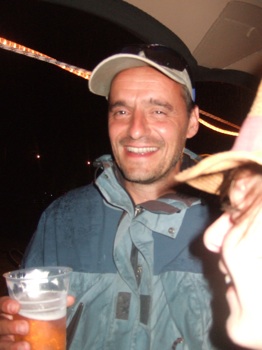
KP: You mentioned in an email that the government budgets for conservation have been cut there, as they have been here in the US. Do you think the frustrations of having to deal with that will affect the tone of some of your music? It can be challenging to stay upbeat and optimistic these days although there is still so much beauty around us.
MH: That's a good question. Yes, we are facing huge budget cuts as a result of the global financial crisis and there is a lot of uncertainty. There is no doubt that budgets for conservation will be severely cut along with many other things. In a way though, this isn't new. We've always had to fight for resources for conservation and I think we've gotten pretty good at it over the years. There are always opportunities and possibilities, and I'm lucky enough to work with very creative people who constantly think of new ways of overcoming problems and thinking up new solutions, so we're ready to adapt as necessary. In terms of my music, the only effect I envision is a lack of time and energy to compose and record. The inspiration for the music remains the same and the way I feel about the world doesn't change very much, so I don't see myself writing any thrash metal tunes in the near future!
KP: Whew! I was a little worried there! When did you start playing the guitar?
MH: I started playing the guitar at the age of 13 on the day the Queen came to our town. She was only passing through, but because she was coming, the school shut for the day so that the pupils could line the streets and wave at her. A few of my friends and I weren't terribly interested in doing that so we decided to cobble together what instruments we could find and have a jam. We started a band and I played bass because I couldn't play the guitar as well as my friend. We actually got quite good, I think. We played a lot of cover versions by The Jam, The Police, The Doors, Led Zeppelin etc...and I was hooked.
KP: Are you mostly self-taught?
MH: Yes, I'm completely self-taught. That's why it's taken me so long to get any good! I've always watched other musicians intently, particularly guitarists, and then gone away and spent hours trying to play what they were playing. Everyone tells me I've got a terrible memory and they're right! But I've got a very good memory for music. I can't read or write a note, but I can remember the music I've heard and reproduce it accurately. That's how I am able to compose, I suppose. Once the song is formed, I can remember every note of every instrument playing on it, which is pretty lucky. Otherwise I'd really be struggling!
KP: When did you start composing music?
MH: It was quite suddenly about seven years ago. I was playing around on the guitar as I'd always done when suddenly I became aware that I was playing a tune I didn't know. I had a good think but couldn't place it and then started to realise that it was original! It seems a bit silly now, but I was absolutely thrilled! This had never happened to me before, but it was always something that I'd dreamed of - to write my own music! It was like I was leaning against a closed door and it suddenly and inexplicably swung gently open. And there I was in a new land of possibility. Since then, the songs have kept coming to me, even though after each one I wonder whether it will be my last.
KP: What inspired you to start composing?
MH: It was just an accident. I didn't think I could compose, and then suddenly I could! When I compose now, I don't consciously sit down to do it and then it happens. Either a tune comes to me or it doesn't. If it does, I have to get it down as quickly as I can before it disappears. I think the emotional basis for all my music is pretty deep and solid, so the inspiration is always there. It's just that the music doesn't always come. That's the only way I can describe it - the music comes to me. I feel very fortunate.
KP: About how many pieces have you composed?
MH: Well, there are thirty on the two albums released to date and I suppose another twenty in various forms on the garage floor so to speak. I'm currently working with about ten for a new album and hoping that more will come as I tend to need about fifteen for a finished album. Most of the new songs are performed on a nylon string guitar which I'm really enjoying experimenting with. It's allowing me to create different sounds from the steel string and I'm enjoying trying to develop something original and distinctive. I always try to let the melody do the talking in my songs, rather than trying to impress people with the "look how clever I am" approach. Mind you, that could just be my excuse for not being able to blow people away with fancy fingerwork!! But seriously, it's important for me that each song is distinctive and memorable and that the melody is the most important thing. I'm not a creator of soundscapes for their own sake. I like them to tell a story, although ultimately it is the listener who decides what that story might be.
KP: How do you choose the titles for your pieces?
MH: I once saw an interview with Pat Metheny who said that choosing titles for instrumental music can be quite tricky given that you could call a song without lyrics anything you like - I think he used the example "My Dog Spot." I usually settle on the title that first comes into my head during the composing or performing process, and so far that has been pretty easy. The images for the songs in my head all come as the notes do, so by the time I've finished I usually know exactly what the song should be called.
I have something called synaesthesia (you'll have to google it for a definition of what it is), which basically is a bit of funny wiring in the brain that results in a colour response to words and sounds. For instance, when I see or hear the word Wednesday, I see a colour (in this case sky blue), or the number three is dark red. As it turns out, about 10% of people are synaesthetes, and all have their own colour response to words and sounds. I think that the way I imagine music and images in my head is related to this condition and the way I "memorise" music is quite similar. So the titles for the songs are very specific to the experience or group of experiences that I am expressing emotionally.
KP: Is most of the music you have composed gentle and soothing like the pieces on your albums or do you have another musical side?
MH: I play all kinds of music on my guitar, but the music I compose is all pretty gentle. I guess it's just the way I am. I don't have a need to express rage or frustration or even wild excitement musically, although I love playing other people’s music that expresses all those things. For instance, I love trying to play funky bass like a Jaco Pastorius, or huge guitar riffs like an Oasis or Coldplay, but I'm happy to compose the music that I do because it appears to be what I'm quite good at, and it's what I want to say musically. People often ask me if I might write lyrics for the songs, as though perhaps something is missing. I don't feel like that. I've always felt that instrumental music tells it's own story and doesn't require words to guide the listener. I've never heard anyone suggest that a classical symphony should have lyrics so I'm not sure why there's confusion with other forms of instrumental music. But I digress, sorry!
KP: I couldn’t agree more. I’ve spent so many years playing and listening to instrumental music that I find that vocals and lyrics often get in the way. I like visualizing what a particular piece of music might be about instead of having everything spelled out in words.
How did you hook up with Real Music? Your music seems to be a perfect fit for them.
MH: It was all just chance I suppose. After recovering from the shock of composing my first piece of music, I quickly had to learn how to record it. I had absolutely no idea how to do this so I set about trying with various bits of kit and of course getting it horribly wrong. Eventually (and I'm talking a couple of years here!), I taught myself how to use Sonar Cakewalk on my computer and how to record and produce various instruments and tracks on there. Anyway, to cut a long and boring story short, I eventually got good enough at it to start sending out demo CDs, which I did by the bucket load. Real Music was one of many companies that I sent the music to, not really knowing whether anyone would ever be interested. It didn't even occur to me to self-release as so many of the artists that you review have done. I wouldn't have had a clue how to do it, and still wouldn't. Anyway, about three years (I'm not exaggerating) after sending a CD demo to Real Music, and having received lots of polite rejections from other labels, I received an email from Terence Yallop saying that he'd like to use one of the tracks on their Sacred Spa Series compilation album. I nearly fell off my chair with shock! Of course, in the intervening three years I had composed quite a few more songs, so I hastily sent them to Terence and asked him if he'd consider them for an album. When he said yes and
Time Stands Still was born, it was one of the proudest moments of my life, and I still have to pinch myself. It's funny that you think my music is a perfect fit for them because I didn't think so. I thought that they were taking a bit of a gamble on me and I'm still not really sure why they did. So I feel very lucky. When I look back, I realise how important it was for me, with no background in the industry, to get that kind of affirmation from such a well-established record label. It gave me real confidence in what I was doing and I feel that I owe Terence and Karen a great deal.
KP: I think your music is a perfect fit because Real Music has always supported environmental issues, and they emphasize the need for soothing and relaxing music that is well played and well engineered. Bingo!
Do you come from a musical family?
MH: Yes, we are all very musical. My brother and sister play various instruments and we all have different tastes and interests. I wouldn't say though that we have an amazing musical pedigree or anything, but the love of music is definitely there in all of us.
KP: Have you done much live performing?
MH: Well, I have in bands as I've mentioned, but I've never performed my own music to a live audience. I've thought about this quite a bit recently after reading your interviews with Kevin Kern which, if you read them in order, show how his attitude to playing live changed from the early days when he didn't think it would be possible, to eventually performing in Taiwan I think! I can understand that. If you're a composer and recording artist as opposed to a touring band you don't really think much about performing live until your albums start to gain a bit of interest. Also I'm not sure how I might do it without a band and anyway probably no one would come!
KP: Oh, I think you’ll attract an audience as people become more aware of your music! Kevin was concerned that since his music is so soothing that everyone would be asleep before he played half of the concert. I remember those conversations and how puzzled I was that he didn’t think he could hold an audience’s attention. I’m very proud of the fact that one of his first live performances was at my house, and the reaction of the people who were there helped him to realize that he could indeed be very effective in concert. Kevin is a great friend, and it’s been such a heartwarming experience to see his career blossom over the years.
Are your children showing any interest in music? How old are they?
MH: My children are Sam (14) and Emma (12), and yes they're both really in to music. They play, or have played, clarinet, piano, cello, drums and guitar. They do all this at school, which I think is great. Gradually, interest in the former instruments has waned a bit in favour of the guitar, which they can play their favourite rock music on, but because they have a good grounding and can read music I think they'll be in a much better position than I was for playing anything they want in the future, and just enjoying it.
KP: What and who have had a significant influence on your music?
MH: We all have long lists of musical influences, don't we? I'm no different. I like a wide range of music, but I think the biggest influences have been the amazingly gifted jazz artists that first opened up my awareness of instrumental music, which I've always loved. When I first came across musicians such as Jan Garbarek, John Abercrombie and Pat Metheny on the ECM label, I was totally blown away. That's when I got really interested, and have since marveled at the wonderful sounds of Dino Saluzzi, Kenny Wheeler, Tomasz Stanko and my absolute favourite, Marcin Wasilewski. As a great lover of the piano, I'm sure you would appreciate his sublime playing if you haven't already done so. His "Trio" albums are absolutely beautiful and I can't recommend them highly enough. Lately, because I like to go to music festivals, I've been getting a lot of inspiration from the likes of Fleet Foxes, Iron and Wine and Low Anthem, even though their musical style is bit different from mine. Again I think it's their great melodies that inspire me most. I like to think that even though my music is classified as new age, there is a folky element to it. I was pleased that you alluded to that in your review of Time Stands Still, so thank you for that.
KP: Have you lived in Wales all of your life?
MH: No, I was born in Liverpool and grew up close to there. We moved to Wales in 1992 because my partner Claire and I both got jobs working in the National Park in Pembrokeshire, which is in South-West Wales. It's a really beautiful part of the world and we feel lucky to be able to live and work here. It's also a pretty good place to bring up children I think. It's great for outdoor activities, but if you're the type that needs the attractions of the big city, you're not going to fit in too well. Not to say that we don't often go to the cities for breaks, but it's nice to get back out into the space after a while.
KP: I agree. I lived near San Francisco most of my life, and just love being out in the “boonies” on the Oregon Coast.
What has been your most exciting musical moment or experience so far?
MH: I think when Real Music offered to release Time Stands Still - the excitement of that moment will be hard to beat, although I can honestly say that every time a new tune comes to me I get ridiculously excited still. Long may that continue.
KP: Indeed! Who are your favorite composers?
MH: All of the guys mentioned above and lots more. To be honest, every time I become aware of new musicians and composers I just think "wow." Through reading your website reviews and then listening to artists that frankly I wouldn't have even heard of, I've become aware of so many amazing artists. And of course because of the wonders of the internet, I can sit and listen to their work and just admire.
KP: Who are some of your favorite performers?
MH: Again, the artists I've mentioned above I'm really enjoying at the moment. At the weekend at the Green Man Festival I was lucky enough to see great bands like Wild Beasts, Mumford and Sons, Doves, Efterklang, Joanna Newsome and many more. The show of the weekend was undoubtedly performed by The Flaming Lips. I'm not really into their music, but the stage show was absolutely awesome and hilarious. I loved it.
KP: If you could have any three wishes, what would they be?
MH: Three? I'd be lucky if I could think of one! Usually what I wish for isn't nearly as good as what happens, so I'd probably refrain I think. It's all good isn't it?
KP: Sure! What’s up next for you?
MH: Well I'm working hard on new songs with a slightly different style on the nylon string guitar, and I'm enjoying that. I wrote one called "Never Far From You" this morning which I'm really pleased with, and I hope that I'll be able to do another album. I guess I really hope that I'll be able to spend more time creating music and less time in the office, but we'll see.
KP: Is there anything else you’d like to talk about?
MH: Only to echo what others have said before in thanking you for taking the time and the interest in our endeavours. I think what you do is wonderful and shows an amazing love and commitment for music and gives artists like me an opportunity that we otherwise wouldn't have. So thank you so much Kathy and good luck with everything that you do too!
KP: My pleasure!
To learn more about Mike Howe and his music, please visit his
Artist Page here on MainlyPiano.com or on
Real Music. You can also hear samples of his music on Amazon.
Kathy Parsons
August 2010

